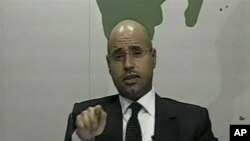An independent investigation has been launched in Britain into a top university's links with Libya after the university's director resigned over the controversy.
Britain’s London School of Economics had been put under the spotlight because of its ties to Gadhafi and his family.
Under investigation
The university accepted a research grant worth more than $2 million from a foundation run by Gadhafi’s son, Saif al-Islam Gadhafi.
On Thursday, the university’s director resigned, the first high-profile Briton to lose his job in connection with British business links with Libya. Sir Howard Davies told the BBC that he had to take responsibility for the damage done to the university’s reputation.
"I think the school will recover, it's a fine institution, which I have become very fond of," said Davies. "But I think it will recover more quickly if I accept responsibility for two errors of judgment."
Those two errors, he said, were advising the London School of Economics to accept the Ghadafi donation and to act himself as an unpaid economic envoy to Libya.
But he said the university's academic independence has not been infringed.
Rodney Wilson, an international relations expert at Britain’s Durham University, says accepting such a grant was a precarious undertaking.
"Quite a lot of this was basically to support research and conferences and workshops, which are supposed to be independent and unbiased," said Wilson. "Well, obviously if you're getting funding from Libya, that kind of undermines the academic integrity of such gatherings and research."
Alleged plagiarism
Now an investigation is to be launched into whether the London School of Economics' academic independence was breached.
Also investigated will be the doctoral degree of Gadhafi’s son, Saif al-Islam Gadhafi. There have been reports that Saif al-Islam Gadhafi, who had been a student at the London School of Economics, plagiarized his 2008 thesis.
Wilson says Saif al-Islam Gadhafi has for a long time played a key, though unofficial, role in financial relations between Libya and Britain.
"He was at the London School of Economics, he has always been a fairly frequent visitor to London," Wilson said. "And although he doesn't directly control the Libyan sovereign wealth fund, nevertheless obviously getting him on side was very important to any investments and deals that they have been involved in."
Past accusations
Libyan leader Gadhafi, once called the "mad dog of the Middle East" by a U.S. president [the late Ronald Reagan], was tied to terror attacks in Europe and accused of supplying the Irish Republican Army with weapons.
But in 2003 Gadhafi renounced terror, and Britain has worked hard to build business links with his country, the world’s 12th largest oil exporter.
In 2007, the British oil giant BP signed a deal with Libya worth at least $900 million.
"It was believed that by basically pursuing better relations with Gadhafi and his regime that this might wean them away from this sort of activity, and the evidence is that it has," Wilson explained.
Ghadafi spoke at the London School of Economics as recently as last December. The university has produced 16 Nobel Prize winners.




